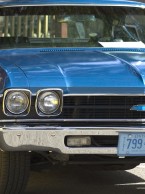Section 135 has exchanged hot coals for Pentecostal fire
They pulled up at the nondescript brick-built warehouse on the outskirts of Cambridge, squeezing the car into a slice of air between an upbeat Chevy and a downtrodden Beatle. The menagerie of vehicles in the car park promised a veritable zoological jamboree if their owners were as diverse. Vernon wondered if he would need a shoehorn to ease them both out of the cabriolet and, to his shame, swore uneasily under his breath. Humans he felt were overrated and there were just too many of them. As they approached the entrance the vibrant music he could feel in his chest contradicted the functionalism of the retail-park foyer.
“Hi there; good morning.”
Just inside the entrance the welcoming committee stood poised to dispense practised empathy and anointing. The pleasant American voice was owned by an attractive woman of Japanese descent and Vernon was handed a printed welcome pack by her vivacious Hispanic colleague. Their greeting seemed genuine and for a moment Vernon and Nsansa were bathed in heaven’s beam of love.
On realising that it was directed toward the weary pensioner grappling with the door behind him, Vernon stifled his response to the other woman’s “Lovely to see you thees morning” Their moment had passed.
They found their seats in the auditorium, and as Nsansa stood swaying and soaking up the rhythms and melodies of the worship band, Vernon looked around him curiously. Jesus had always managed to draw an international following he thought, hadn’t Palestinian shepherds and Iranian kings rubbed shoulders at his birth in a building as nondescript as this. It all seemed to make sense somehow and so he too stood, soaking up the music with more than a little interest directed towards the band’s very competent drummer.
As the final strains of ‘Lord I lift your name on high’ hung in the air like the vapour trail of a passing jet, a black pastor jumped to his feet and prayed that his words would be God’s words. Vernon hunkered down for the inevitable sanctified stream of consciousness, resolute the way he had been in school assemblies, to see it through to the end whilst enduring the foot persistently kicking the back of his chair. There was of course no seat kicking now and though the address was undoubtedly fast-paced it was not what he’d expected.
A fiery apostle’s ancient letter to the Christians in Rome bore a disarming message… it was not presented as a call for Holy War but an invitation to inner peace. ‘If God is for us, who can be against us?’ Entranced, Vernon lowered his world-weary defences and absorbed the spirit-lifting antidote to the poison of self-reproach. ‘He who gave up his own Son for us all… will he not also graciously give us all things?’ Vernon held his breath, dreading the hollow promise of a prosperity gospel… and released it with a sigh of contentment. Here was the heart of religion surely; ‘It is God who justifies. Who then is the one who condemns?’ The dubious testimony of answered prayer that followed, the several unsolicited offers of prayerful counselling, even the church–grade coffee-with-chicory failed to rob him of his glimpse of heaven. How to hold on to the gift of faith without becoming a debtor to religion that was the problem; how to occupy every room in the house with a God who liked to Spring clean?
Check out the path to this moment on The Novel page




